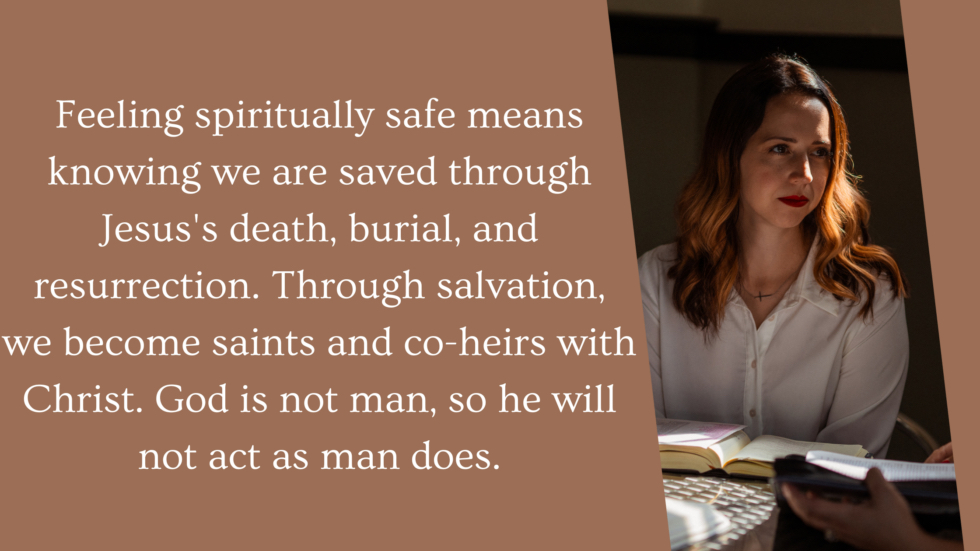We all have moments in our lives where trust between relationships breaks. We go from feeling seen and heard to wondering if anyone will notice the pain we carry. The question always comes up, “If people continue to hurt me, how can I trust that God isn’t hurting me too? How do I feel safe with God?”
We question the goodness we hear about.
We wonder what this love is that people speak of.
In our minds, we know the word says God cares and He won’t leave us but it becomes hard to receive in our hearts when it seems as though relationships become like revolving doors, people going out and people going in without staying long at all.
Please note: Emotional safety does not apply to abusive relationships. If you’re experiencing physical or emotional abuse, you have several options for seeking help. Try reaching out to a trusted friend, family member, or therapist or calling a domestic violence hotline.
What Makes a Person Feel Safe?
When we feel safe, we feel seen.
When we feel seen, we feel heard.
When we feel heard, we feel loved.
The Hebrew word translated as “safety” in the Old Testament means “a place of refuge; security, trust, confidence, hope.” Proverbs 18:10 describes “the name of the Lord as a strong tower into which the righteous run and find safety.”
Safety also involves trusting in the Lord, according to Proverbs 29:25, which says, “The fear of man lays a snare, but whoever trusts in the Lord is safe.”
To feel safe is to know you will not be harmed mentally. Therefore, to feel safe means:
- You can share openly what you are going through without being manipulated or called names (ie, that’s stupid, and you shouldn’t feel that way)
- When you are around someone, you know they want the best for you
- You are not constantly questioning that maybe you are the problem
- You may experience less worry and overwhelm in their presence because you are reminded you are not alone
- It will make you feel valued and valuable
- You can show your weaknesses
How to Feel Safe Emotionally and Spiritually
Feeling safe, which is also called psychological safety, means being assured that we are not in danger. Having a sense of well-being can’t fully happen if we don’t feel safe first.
Try to notice how your body responds when you start to feel unsafe. You may feel like your heart is racing, you might feel like you are losing control, or you start to feel anxious or want to leave the situation or room right away. The reality is that most of the time, we are not in real threatening danger, and those reactions are only a sensation created by how our minds perceive the environment to be. (Or what we have learned through the behaviors of others.)
To feel safe, we must address what makes us not feel safe.
When we think about feeling safe with God, we realize that we don’t trust God because we have a hard time trusting people.
We think God will treat us the same way people do. Therefore, we don’t want to go to God with how we feel, release our pain, or unforgive because we fear, “Well, maybe He is going to use this against me like everyone else does. Maybe He won’t even hear me or care to listen.”
Numbers 23:19 says, “God is not man, that he should lie, or a son of man, that he should change his mind. Has he said, and will he not do it? Or has he spoken, and will he not fulfill it?”
Feeling spiritually safe is knowing we are saved through the death, burial, and resurrection of Jesus. Through salvation, we become saints and co-heirs with Christ. God is not man. Therefore, He will not act as man does.
We are no longer a slave to this world nor subject to the god of this world. To become saints is to hold a new position and authority against the evil that comes our way.
It’s understanding that God is not the author of sin. Therefore, He can not be the author of its consequences either.
Feeling safe with God means:
- We know He will not use our pain against us
- We know His love is not abusive nor defensive
- Understanding that He sees your heart
- Understanding that He hears your prayers
Read about His love in 1 Corinthian 13:4-7.
“Love is patient and kind. Love is not jealous or boastful or proud or rude. It does not demand its own way. It is not irritable, and it keeps no record of being wronged. It does not rejoice about injustice but rejoices whenever the truth wins out. Love never gives up, never loses faith, is always hopeful, and endures through every circumstance.”
Since God is love, He is these things towards you.
Questions to Consider to Feel Safe
- What has caused me to feel unsafe?
- What steps can I begin to take to restore safety?
- What conversations do I need to have? Boundaries to put into place?
- What do I believe about God’s protection? And why?
- Do I trust God with my heart beyond knowing Him with my mind?
Examples of Boundaries That Promote Feeling Safe
- Honoring God first and most – recognize what hinders putting God first in your life
- Honoring your priorities
- Sharing your personal information at a comfortable pace, slowly and gradually
- Taking time to be alone with God and asking for it
- Communicating what you need
Safety Scriptures
“But the Lord is faithful, and he will strengthen you and protect you from the evil one.” 2 Thessalonians 3:3
“The Lord is my light and my salvation— whom shall I fear? The Lord is the stronghold of my life— of whom shall I be afraid?” Psalm 27:1
“Whoever dwells in the shelter of the Most High will rest in the shadow of the Almighty. I will say of the Lord, “He is my refuge and my fortress, my God, in whom I trust.” Psalm 91:1-2






